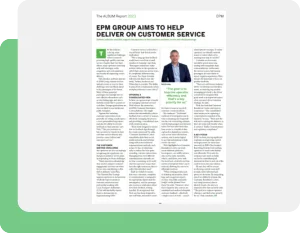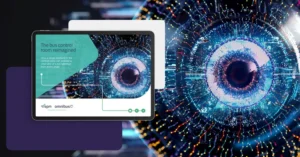Supporting bus operators to transform customer service and rebuild patronage.

The bus industry is facing some significant challenges when it comes to providing high-quality customer service. Despite their very best efforts, many operators need help with staff shortages, traffic congestion, and post-pandemic uncertainty all impacting service delivery.
Nick Brookes, software director at Velociti Solutions, believes the bus industry needs to react to these challenges and also think ahead to the passengers of the future.
Many of these potential passengers increasingly turn to cost-effective alternatives such as ride-hailing apps and micromobility modes like e-scooters or cycle hire. Younger generations are also less likely to use traditional public transport. “Against this backdrop, customer expectations more generally are rising: people expect a more personalised experience and also the ability to provide feedback on their journey,” says Nick. “This puts pressure on bus operators to transform their customer service delivery and provide a more tailored and responsive service.”
The customer service challenge
Bus operators are also increasingly recognising the significant role that good customer service plays in responding to those challenges.

“Many operators acknowledge they need to enhance customer engagement, but there are other factors also contributing to this shift in attitude,” adds Nick. “The National Bus Strategy requires operators to demonstrate wholesale improvements in customer satisfaction and partnership working with Local Transport Authorities (LTAs) will inevitably require them to demonstrate its happened using KPIs.”
Customer service is therefore a crucial factor that should not be overlooked. “Not so long ago that feedback would have come from a small number of channels,” says Nick. “Passengers would have either written a letter to the operator or called their customer service team.
It’s completely different today, of course. Yes, those channels still exist, but there’s now also email, Twitter, Facebook, and WhatsApp to consider. The ability to proactively communicate across multiple platforms is now critical.”
Offering a consolidated view
So how can operators get a handle on managing customer service? Nick believes the answer lies in Velociti’s Customer Resolution Centre platform, a single system that automatically collects feedback from a variety of sources, effectively managing the process and providing a consolidated view of all communication.
“It has been designed to ensure that no feedback slips through the cracks unnoticed,” he adds. “Customer Resolution Centre consolidates data from social media networks and websites along with more traditional communication methods, such as face-to-face or telephone calls, to reduce the time spent recording customer interactions.
Managing these very different communication channels can be time-consuming, so it’s really vital that operators ensure they have the right systems in place to collect the data they need.”
Built-in workflows ensure that every comment, complaint or commendation is assigned to the appropriate department for investigation, and the passenger also receives a notification about how their feedback is being handled. It’s an approach that Nick says has been designed to save staff time and make it easier for them to keep on top of all customer communications.
He continues: “Traditional methods of investigation can be time-consuming and frequently run the risk of straining relations with both passengers and between teams, but operators these days have access to a wealth of data captured in standalone systems, such as real-time information systems, and it seems logical to use that information to help resolve the issue.”
Nick highlights how Customer Resolution Centre can work across different platforms. Investigators can swiftly retrieve data on the route, timetable, vehicle, and driver, even with the most basic of details and that means investigation times can be reduced, allowing the case to be efficiently resolved.
“When looking at data such as ticketing information, driver logs, and congestion reports on their own, little actionable insight can be gleaned from them,” he adds. “However, when these disparate data sources are combined and analysed alongside customer feedback – effectively a single source of truth – a much clearer picture emerges. It means operators can identify network issues or routes where extra running time may be needed.”
Customer service teams inevitably spend more time dealing with complaints than commendations, not because the service is poor, but because passengers are more likely to report negative experiences. Nick stresses it’s important to focus on positive feedback.
“There are well-known industry driver recruitment and retention issues, so ensuring any positive messaging gets back to the driver concerned to recognise their good work is an important aspect of an operator’s driver retention strategy,” he adds.
Nick also feels that Customer Resolution Centre can improve compliance. “That consolidated view means you’re capturing a comprehensive snapshot of the business,” he says. “There isn’t the risk you’re missing silo datasets, so there are some real benefits when it comes to Traffic Commissioners and regulatory compliance.”
A key focus
Velociti Solutions has been placing significant emphasis on improving control room processes for some time now with its BIRS (Bus Incident Reporting System) tool enabling operators to work more flexibly and efficiently. Nick adds the company now wants to build on this by consolidating all information flows in and out of the control room into one solution.
He says this will be crucial in allowing control room staff to make more informed and proactive decisions. By integrating data from different systems, like Customer Resolution Centre, and using historical data to identify trends, the aim is to eliminate silos that currently exist.
“The goal is to improve operator efficiency and that’s a key priority for us,” Nick concludes.



